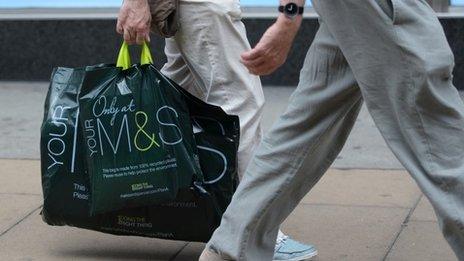M&S’s never-ending rebuild
- Published
- comments

Online sales at M&S have fallen by more than 8%
Marks and Spencer has announced that online sales have fallen by more than 8% after its new website launch suffered from a period of what the retailer described as "bedding in".
In an age of phenomenal digital retail growth, the drop certainly bucks the market. Sadly, it's in the wrong way.
Like a home owner with the builders in, chief executive Marc Bolland insists the house will be lovely once the work is finished. Lots of new content, videos and ways of shopping online will bring customers flooding back, he says.
M&S did warn the market earlier in the year that the launch of the new website would mean an initial drop in customers registering to use it.
Alan Stewart, chief financial officer of M&S, describes the retailer's new website as "like going to the supermarket for milk".
"You know it is there but you have to walk the aisles to find it," he said.
The problem is that in an age when loyalty to the traditional retailers has fallen markedly, the fact that lots of other people are also selling milk sucks customers away. Once lost, it can be hard to persuade them back.
'Stumbling around'
Looking at the, totally unscientific of course, Twitter reaction to the news on Tuesday morning, some people are indeed finding it difficult.
Joseph McGrath @JosephMcGrath4
@bbckamal Have you tried to buy online from M&S? Not so easy.
Is just one example.
Stumbling around the new site has, one assumes, turned people off. And, as one head of a digital retailing organisation once told me, if you need more than three clicks to find anything, you are likely to lose the customer.
Particularly when - as M&S is doing - the focus is on protecting profit margins rather than indulging in constant sales promotions. Online is incredibly susceptible to special offers. And total simplicity.
M&S is only just over half way to registering the six million people it wants on its online site. Expect another quarter at least of tricky digital numbers.
Mr Bolland will have to ensure that all is running smoothly by the time of peak sales, the end of November and the run into Christmas. Positive festive numbers will now be more vital than ever.
Mr Bolland is ever the optimist - saying this morning that he is enjoying the job and this is "a journey". It's just a pretty long one.
Bright points include like-for-like food sales which are up 1.7% and international sales up nearly 5%, largely down to new store openings. Overall group sales are up over 2%.
But clothing sales - a constant concern for investors - are down 0.6%. That division will need to see the improvement in womenswear (where like-for-like sales are slightly up) extended to the rest of the range.
Mr Bolland is heading to Wembley Stadium this morning to face investors at the company's annual general meeting.
He will face some tricky questions.